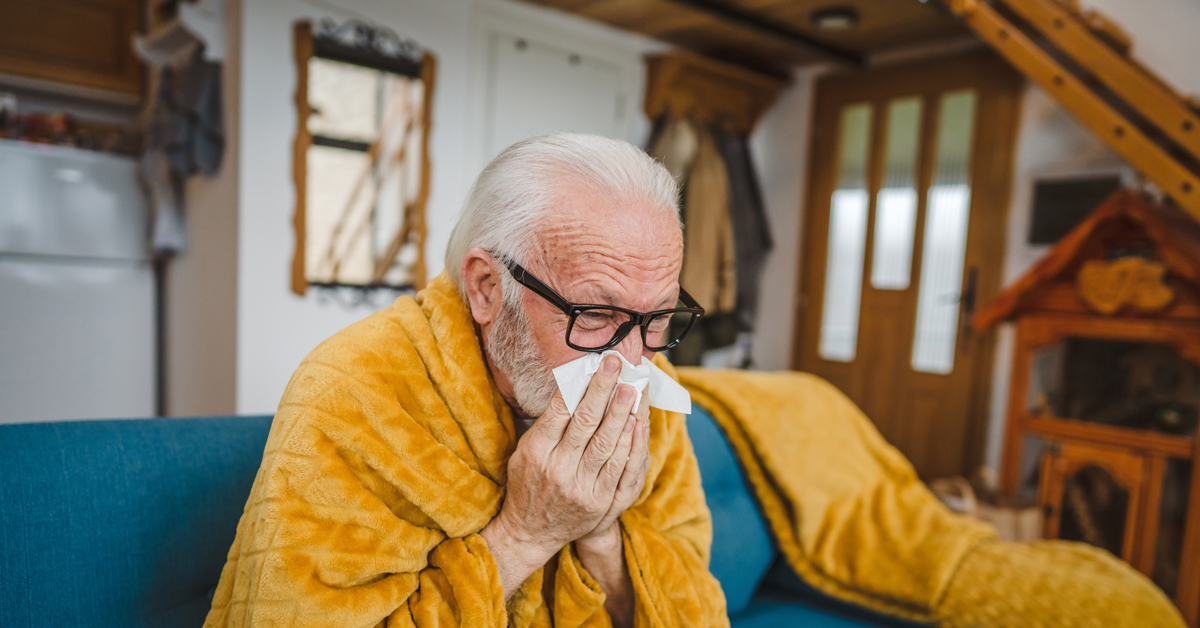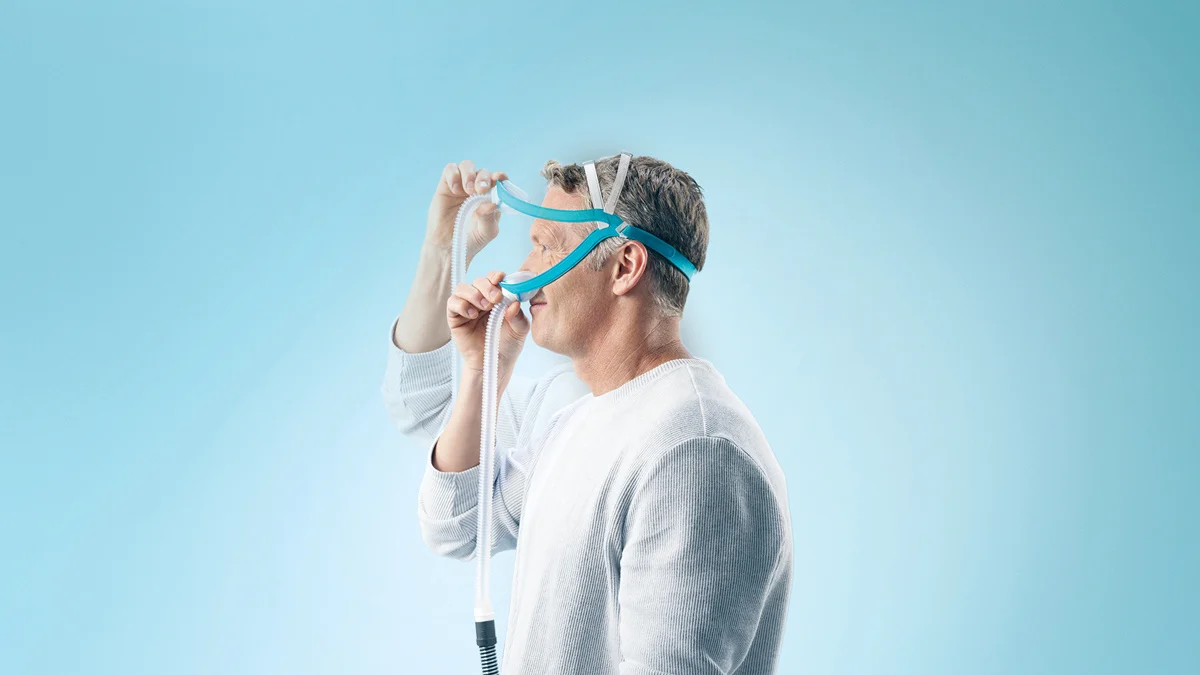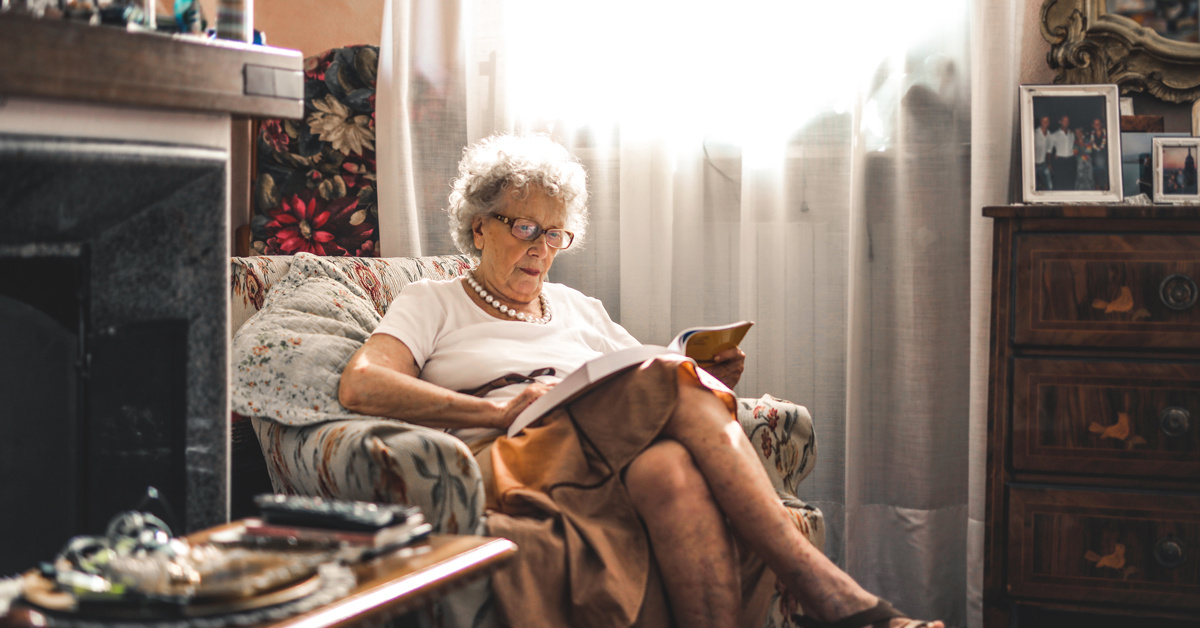CPAP machines are proven effective for treating sleep apnea. Here are ways to prevent or manage common challenges.
Sleep apnea happens when a person’s breathing stops or is interrupted repeatedly throughout the night. This causes poor sleep, reduces oxygen to vital organs, and increases the risk of other health issues, such as diabetes, heart disease, and high blood pressure.
A popular and effective treatment for sleep apnea is CPAP (continuous positive airway pressure). You wear a mask over your nose or mouth while you sleep. It is connected to a machine that delivers a constant flow of air to keep your airways open so you can breathe—and sleep—normally.
⭳ Download a printable version of this article (PDF)
However, many people have a hard time sticking with CPAP treatment because they find it uncomfortable. But there are simple things you can do to make CPAP treatment more comfortable, so you can enjoy its benefits and get a good night’s rest.
Apria is a leader in sleep apnea treatment. We provide care to thousands of people across the country. Here are the most common complaints about CPAP we’ve heard over the years—and how you can prevent or manage them.
1. “My mask doesn’t seem to fit, and it leaks.”
We hear this a lot. It’s critical that your mask fits properly. If not, the following can occur:
- Your CPAP machine probably won’t reach your prescribed pressure, so you won’t get the full benefit of your treatment
- The mask can release air into your eyes, causing them to become dry or teary
- The mask can be noisy and disturb your partner’s sleep
- A mask that doesn’t fit properly is uncomfortable and can cause skin irritation, sores, and bruises
Robert Miller, a registered sleep technologist and vice president at Apria, offers a solution: “Apria has implemented new tools that include using AI mask fitting capabilities for our Sleep Coaches that help to select the appropriate type and size of mask for our patients.”
2. “I’m not sure if I have the right type of mask.”
The three most popular types of masks are:
- Full face masks that cover your mouth and nose
- Nasal masks that fit over your nose only and are lighter than full face masks
- Nasal pillow masks, which are even lighter and smaller than nasal masks
All these masks are available in various sizes.
The following mask types aren’t prescribed as often but are appropriate for certain patients:
- Total face masks that cover the whole face
- Oral masks that cover the mouth only
- Hybrid masks that offer various combinations of the CPAP masks described above
The solution to getting the right mask for you: Work with Apria's respiratory therapists to decide which type of mask best suits your needs and preferences.
3. “The mask makes me feel claustrophobic.”
It takes time to get used to a CPAP mask.
Here’s a solution: Try wearing just the mask for short periods during the day.
When that feels comfortable, attach the hose to the mask and turn on the machine. Watch TV, read a book, or even cook.
Once you get used to the mask, the next step is to use the CPAP machine every time you sleep—even when you nap.
Robert Miller from Apria adds, “Stick with this for a few weeks to make sure the mask and pressure settings are right for you. If you still have problems, be sure to talk to one of our respiratory therapists here at Apria.”
The more you stay on your CPAP treatment, the better you’ll sleep—and the better you’ll feel in the morning and throughout the day.
4. “I have a hard time tolerating the forced air from the mask.”
Your CPAP machine has a feature called “ramp.” This lets you start with low air pressure. Then the CPAP machine automatically and gradually increases the air pressure until it reaches your prescribed pressure.
If you are still having a problem, talk to your doctor about adjusting the rate.
Still having a problem? Your doctor may switch you to a BPAP (bi-level positive airway pressure) machine, which delivers more pressure when you breathe in and less when you breathe out.
5. “Falling asleep is difficult when I wear the mask.”
This is normal for people new to CPAP therapy. It’s also temporary. Here’s what you can do to fall asleep more easily.
As stated above, wear the mask during the day to get used to it. Then, at bedtime, the ramp feature can “ramp up” the pressure over a period of time and make you feel more comfortable.
Also, be sure to practice healthy sleep habits:
- Exercise regularly
- Try relaxation exercises such as meditation or yoga
- Don’t drink alcohol or caffeine before bed
- Take a warm bath
- Don’t try to go to sleep until you are sleepy!
6. “I have a dry, stuffy nose.”
A CPAP machine with a heated humidifier that attaches to the air pressure machine can help relieve these symptoms. You can adjust the level of humidity to moisten your nose. If your CPAP machine does not have a heated humidifier, you might consider getting one that does.
Here’s another solution from Apria’s Robert Miller: “Before you go to bed at night, use a saline nasal spray to prevent dryness and stuffiness.”
A dry, stuffy nose can also be caused by a leaky mask. Talk to your doctor if your mask doesn’t fit properly.
7. “My CPAP machine makes my mouth dry.”
A CPAP machine can cause mouth dryness if you sleep with your mouth open or breathe through your mouth at night. Ask your doctor about a full-face mask that covers both your nose and mouth. Also, a chinstrap can help keep your mouth closed to prevent mouth breathing.
A CPAP-heated humidifier can also help prevent dry mouth. You can easily find items like this and other healthcare items tailored to your needs at Apria Direct.
8. “The noise from my machine bothers me and my partner.”
Today, most new models of CPAP machines are virtually silent. But if you and your partner find the noise bothersome, here’s what you can do:
- Be sure the air filter is clean and unblocked
- Ensure that your mask’s exhalation ports, which allow carbon dioxide to escape, are unclogged and clean
- Ask your doctor or CPAP supplier to check the device to ensure that it is working properly
- Consider using earplugs to block any unwanted noise
- Purchase a “white noise” machine to disguise the noise of the CPAP device
- Put the CPAP machine as far from your bed as possible
The good news: CPAP machines are a lot quieter than snoring, which is very common with sleep apnea!

.png)



